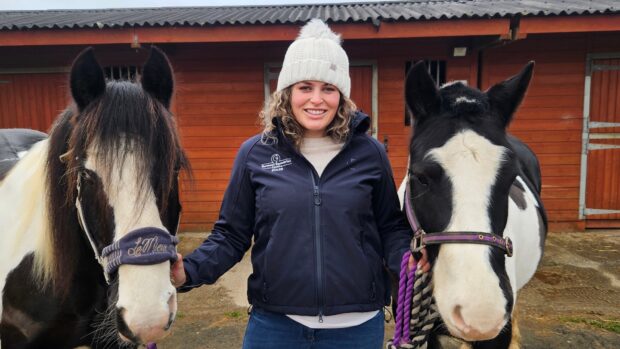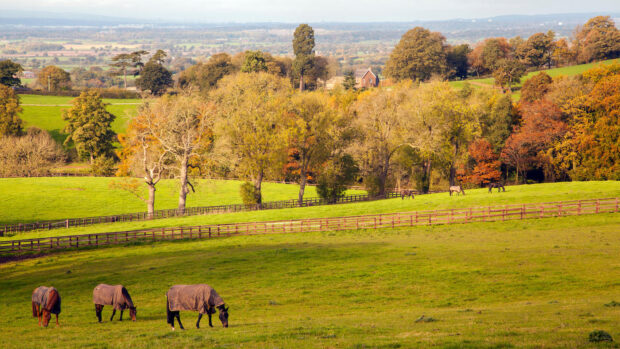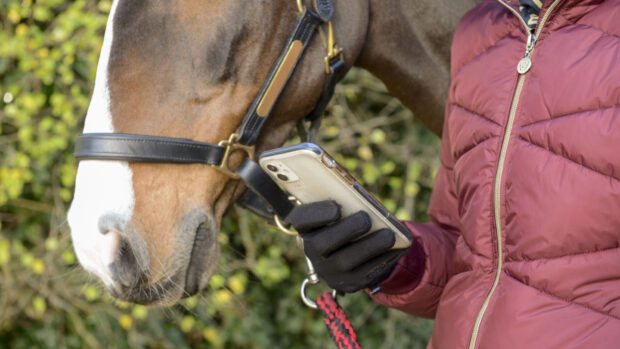The owners of two equine grass sickness (EGS) survivors have launched an awareness week in the hope of “giving something back” and helping other owners.
Basingstoke-based Sarah Hatter and Rhiannon Boyle from Essex will launch the first EGS Awareness Week from 29 March to 4 April. The week will provide facts, scientific information and advice about the disease with input from veterinary experts, feed companies and other owners of grass sickness survivors.
Sarah told H&H she and Rhiannon became friends after discovering each other on Instagram when their horses were going through chronic grass sickness at the same time in summer 2019.
“I had come home from university and the yard said Milo hadn’t been eating or pooing as much,” said Sarah. “He was initially treated for colic and underwent surgery where the vets found a small twist, but they decided to take a small biopsy, and he was diagnosed with grass sickness.
“It was so hard-hitting, and I was told he probably wasn’t going to make it. I just burst into tears uncontrollably. That day my mum Jane took me to the vets for us to say goodbye.”
Sarah said when she arrived at the vet clinic, then six-year-old Milo seemed “bright and perky” and it was decided to give him a chance.
“Seeing him get through the first 48 hours suggested it wasn’t acute, then making it through the following two weeks meant it was unlikely it was subacute. Being a chronic case meant he had a better chance,” she said.
“I have a horsey Instagram account and posted about my Milo having EGS. Rhiannon commented and said her horse Stripe had been diagnosed too and we started speaking from there,” she said.
Milo lost more than 80kg and spent a month in hospital, during which Sarah visited him every day, between sitting her university exams.
“I couldn’t not see him, I just had to and when I left he would become quite down again,” she said. “He had an amazing team at Donnington Grove vets looking after him; vet Imogen Comyn fought so hard for him and vet nurse Leah Grange would spend nights sitting with him. He really thrived on human company so I am so grateful for everything they did for him.
“It was a really long process, some days he would only eat three Polos – then the next day it might be four. I kept a diary and looking back one day he had a jam doughnut, which he loved!”

Milo pictured this year
Sarah said Milo continued to recover at home and by September had regained his strength and started to put weight on. He has since returned to full work and the pair are now enjoying taking part in online dressage. Eight-year-old Stripe, who Rhiannon got from the Blue Cross in 2015, has also made a full recovery, and returned to competing in dressage.
“Rhiannon and I know a lot of cases don’t make it, but when Milo was ill all I read was negative stories and we want to give people some hope. I had never heard of EGS before and at times I would think ‘Am I stupid trying to get him through it?’,” said Sarah.
“It’s was so lovely meeting Rhiannon and just shows that social media can have a positive side. We never thought our horses would make it and we know we’ve been lucky with Milo and Stripe so we really want to give something back. We’re so passionate about raising awareness of EGS and hope this could become an annual week.”
The focus will be on the Equine Grass Sickness Awareness Week Facebook and Instagram pages.
Kate Thomson of the Equine Grass Sickness Fund told H&H the charity is keen to support Shannon and Rhiannon and will promote the week.
Continued below…

‘We need owners to be our eyes and ears’: new five-year research plan for grass sickness
“We’ve done a lot of great work so we’re saying ‘let's gather it together, take a step back and review

Grass sickness – a veterinary emergency needing immediate action

Subscribe to Horse & Hound magazine today – and enjoy unlimited website access all year round
“It would be very exciting to think that this could become an annual event,” she said.
“There are still so many questions surrounding the disease, and we are currently launching our biobank to help us address these questions. We are relying on horse owners and equine vets to work with us to collect as much information as we can about the cases that occur, and we are hoping that Sarah and Rhi will highlight this important role that horse owners have to play.”
An EGS webinar about the biobank will take place on 25 March. More information can be found at the EGSF website.
Horse & Hound magazine, out every Thursday, is packed with all the latest news and reports, as well as interviews, specials, nostalgia, vet and training advice. Find how you can enjoy the magazine delivered to your door every week, plus options to upgrade to access our H&H Plus online service which brings you breaking news as it happens as well as other benefits.




